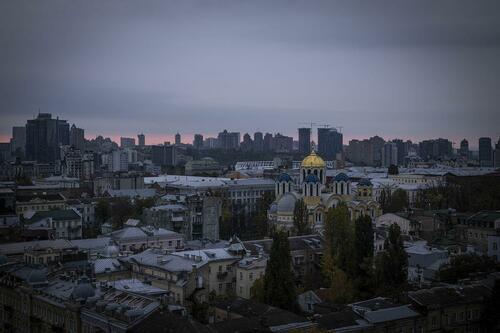Much Of Ukrainian Capital Without Power & Water After New Russian Airstrikes
Much of the Ukrainian capital of Kiev is without electricity or water, after the latest round of major Russian airstrikes on Monday. The Russian military announced ‘successful’ strikes on multiple of the country’s vital infrastructure facilities.
“The Russian Armed Forces continued to launch strikes with high-precision long-range air and sea-based weapons against Ukrainian military and energy facilities,” the Defense Ministry said. “The goals of the strikes were successful. All assigned objects were hit.” Meanwhile, Ukrainian Prime Minister Denys Shmyhal confirmed direct hits on 18 sites – most of which were connected to the nation’s energy supply. These ramped up attacks have created a growing sense of panic with temperatures plunging and winter approaching.
“Missiles and drones hit 10 regions, where 18 sites were damaged, most of them energy-related,” Shmyhal stated on Telegram. “Hundreds of settlements in seven regions of Ukraine were cut off.” Facilities in Cherkasy and Kirovohrad also came under attack. Ukraine’s military said it intercepted projectiles over the Lviv region, which spared this western part of the country from damage.
The Washington Post noted there are “power outages continuing in the Kyiv, Zaporizhzhia, Dnipropetrovsk and Kharkiv regions,” and others. The Post listed some of the below regions impacted by large-scale power outages and water supply disruptions:
Kyiv region: Russian strikes damaged buildings, and rescuers are searching for victims, the regional police said. Attacks left 80 percent of the capital without water and are likely to cause sustained power outages, Mayor Vitali Klitschko said.
Kharkiv: Two strikes hit critical infrastructure facilities in the eastern city, causing problems with the water supply and affecting the public transit network, the mayor said.
Zaporizhzhia region: An infrastructure facility was struck by rockets, the local governor said, prompting warnings from officials in the southern region that energy supplies there could also be affected.
Cherkasy region: Some of the region lost power after air attacks on infrastructure facilities, the military administrator said.
Ukrainian Foreign Minister Dmytro Kuleba condemned the attacks as more war crimes: “Another batch of Russian missiles hits Ukraine’s critical infrastructure. Instead of fighting on the battlefield, Russia fights civilians,” he tweeted.
Massive Russian strikes with over 50 missiles targeting energy infrastructure in Ukraine this morning. Power cuts across several regions. Video shows Dnipro Hydroelectric Plant in Zaporizhzhia oblast after being hit. pic.twitter.com/WscEdaIpKe
— marqs (@MarQs__) October 31, 2022
Additionally Kyiv mayor Vitali Klitschko announced on Telegram that these fresh strikes left 80% of residents in the capital without water and some 350,000 homes with no electricity.
“Just in case, we ask you to stock up on water from the nearest pumps and points of sale,” he advised. The mayor’s office vowed that water supply to the effected parts of the city would be restored in three to four hours, with emergency utility crews working urgently on it.
Rescue teams in the capital are reportedly searching for possible casualties under the rubble of buildings destroyed or damaged from the new salvo of Russian strikes; however, at this point casualty numbers are unclear.
The US ambassador said she and her staff had to take shelter in this latest attack on the capital:
Like millions of Ukrainians, our @USEmbassyKyiv team is once again taking shelter as Russia continues its callous and barbaric missile strikes on the people of Ukraine in an effort to leave the country cold and dark as we approach winter.
— Ambassador Bridget A. Brink (@USAmbKyiv) October 31, 2022
Already before Monday’s attacks, Ukrainian officials estimated that 40% of the nation’s electrical power systems had been severely damaged, and urged households to limit their usage, especially with non-essential large appliances. Ukrainians are further being warned to prepare for long-term power outages as a frigid winter is just around the corner.
Tyler Durden
Mon, 10/31/2022 – 10:00

